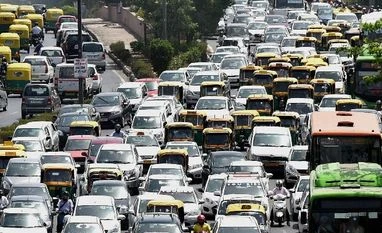The second phase of the ‘odd-even scheme’ came under the judicial scanner on Tuesday with the Delhi High Court seeking the Delhi government’s response to a batch of petitions filed to quash the April 11 notification restricting the movement of vehicles based on odd- or even-numbered registrations.
The main contention in one of petitions was that Section 115 of the Motor Vehicles Act does not empower the government to restrict the movement of vehicles according to an odd-even classification. In support of their stand, the petitioners highlighted that the ambit of the Section was restricted to the movement of traffic for public safety and convenience, and that it could not be invoked to curb pollution.
Another petition filed by lawyer Rajiv Khosla sought exemption of advocates from the scheme on the plea that they assist courts in protecting civil rights and public liberties of citizens.
The high court referred to its previous order dated January 11 during the first phase of the odd-even scheme, where it had asked the government to consider the contentions of a group of lawyers, as well as other petitioners, before implementing the scheme in future.
“Please get instructions and file a status report on whether you have considered this aspect (exempting the lawyers or not). Tell us with regard to the steps you have taken before issuance of this present notification,” the court said.
The other contentions raised in the present petitions before the high court highlighted the arbitrary fixation of Rs 2,000 fine without proper amendments to the Motor Vehicles Act. Concerns over discrimination of ‘non-driving’ over ‘driving’ women also placed before the court as the scheme only exempts women driving in cases of emergency, but does not cover cases of emergency where women are being driven.
The matter has been listed for further hearing on April 25.
The main contention in one of petitions was that Section 115 of the Motor Vehicles Act does not empower the government to restrict the movement of vehicles according to an odd-even classification. In support of their stand, the petitioners highlighted that the ambit of the Section was restricted to the movement of traffic for public safety and convenience, and that it could not be invoked to curb pollution.
Another petition filed by lawyer Rajiv Khosla sought exemption of advocates from the scheme on the plea that they assist courts in protecting civil rights and public liberties of citizens.
The high court referred to its previous order dated January 11 during the first phase of the odd-even scheme, where it had asked the government to consider the contentions of a group of lawyers, as well as other petitioners, before implementing the scheme in future.
“Please get instructions and file a status report on whether you have considered this aspect (exempting the lawyers or not). Tell us with regard to the steps you have taken before issuance of this present notification,” the court said.
The other contentions raised in the present petitions before the high court highlighted the arbitrary fixation of Rs 2,000 fine without proper amendments to the Motor Vehicles Act. Concerns over discrimination of ‘non-driving’ over ‘driving’ women also placed before the court as the scheme only exempts women driving in cases of emergency, but does not cover cases of emergency where women are being driven.
The matter has been listed for further hearing on April 25.
)